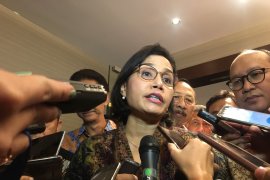"I have instructed that big taxpayers should be tackled on priority while implementing the tax amnesty scheme," Finance Minister Sri Mulyani stated.Jakarta (ANTARA News) - Taxpayers belonging to the middle and low-income strata should not worry about the governments tax amnesty program because it will be enforced only on big taxpayers.
According to Chief Economic Minister Darmin Nasution, the main target of the governments tax amnesty program is to net those taxpayers who own big assets but have not yet properly paid taxes.
The tax amnesty plan also targets whose who stashed assets overseas. It is expected that they will avail of the tax amnesty and repatriate to Indonesia the funds they had parked abroad.
The government has estimated that assets worth Rp4,000 trillion are parked abroad, and expects that about one thousand trillion rupiah will be repatriated. Thus, the government will be able to collect some Rp165 trillion in redemption money and asset declaration funds in the coming nine months, from July 2016.
However, up to the end of August, 2016, assets repatriated were not even worth Rp2 trillion.
Following such a response, the government also intends to bring under the umbrella of the tax amnesty program those taxpayers who had not yet paid their due taxes rightfully at home.
Lately, therefore, many sides understood that the program will also be imposed against small taxpayers. This lead to a degree of anxiety. A social media campaign was launched, urging people to stop paying taxes as the tax amnesty program seemed to have missed its initial target, namely the large tax evaders.
In order to calm down small taxpayers, the government has assured that while implementing its tax amnesty program, it will give priority to the big taxpayers who have not yet fulfilled their tax obligations.
"I have instructed that big taxpayers should be tackled on priority while implementing the tax amnesty scheme," Finance Minister Sri Mulyani stated on Wednesday night (Aug 31).
She pointed out that although the tax amnesty law does not specifically refer to owners of capital or assets stashed overseas, yet the government should implement it on the principle of fairness.
Therefore, the government will intensify its campaign to popularize the tax amnesty program to make people understand that big taxpayers would be brought under it.
The campaign is intended to eliminate peoples worries about the program which, they think, will pose difficulties to small taxpayers.
As explained by Chief Economic Minister Darmin Nasution, the government never designed a tax amnesty program for small taxpayers at home. The focus of the tax amnesty are those who have a lot of money and assets but did not report it, or even stashed these abroad.
The directorate general of taxation has issued a regulation on the elucidation of Law on Tax Amnesty as released on Monday, August 29, 2016. The regulation will be able to clarify any doubts in this regard.
Through the regulation, the director general of taxation, Ken Dwijugeasteadi, assured that the people in the low-income bracket would not be required to join the program. "We had never introduced the program for small traders, fishermen and farmers," the director general underlined.
Finance Minister Sri Mulyani made it clear that the government will focus on big taxpayers and bodies believed to have potentially avoided taxes.
"We will implement it, keeping in view the Constitutions message. The input we have received is that we should focus on big taxpayers and bodies believed to have the potential to avoid taxes," the minister said.
Sri hoped that the discontent that has emerged so far regarding the implementation of the tax amnesty program will be eliminated. The target of the tax amnesty is not people from the middle class or below or the poor, she added.
Public Relations and Service Guidance Director of the Directorate General of Taxation, Hestu Yoga Saksama, said taxpayers, who have not yet followed the tax regulation rightfully, have the right to take part in the tax amnesty program.
Hestu explained that the chance to take part in the tax amnesty program will be given not only to big taxpayers, but also to state officials and members of the public in the middle class category, who are willing to benefit from the program.
However, people whose income is included in the non-taxable category, namely maximally Rp4.5 million per month, such as those of laborers, domestic helpers, fishermen, farmers and pensioners, are not obligated to take part in the tax amnesty program.
"The tax amnesty program does not miss the target, as it could be observed in the fact that we never introduced the program for small traders, farmers and fishermen. So, there should be no opinion that we are turning to the smaller taxpayers as we fail to get the big ones," she said.
Hestu pointed out that state revenues from the tax sector are important as they can be used for executing development programs needed by the people.
To this end, the people are expected to support the governments move to implement the tax amnesty program to increase its tax receipts, so the government would be able to implement various development programs as planned.
"The tax amnesty program is important for continuing the development of the nation. Therefore, we call on all sections of society to support the efforts to achieve the tax receipt target," Hestu emphasized.(*)
Reporter: Andi Abdussalam
Editor: Heru Purwanto
Copyright © ANTARA 2016






